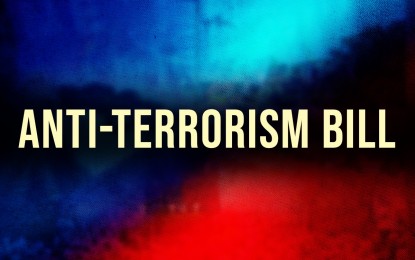
MANILA – President Rodrigo R. Duterte will wait for the vetting process to be finished before he decides to sign or veto the anti-terrorism bill, Malacañang said on Wednesday.
Presidential Spokesperson Harry Roque said the President is still waiting for Senator Panfilo Lacson, the principal author of the measure, to finalize the measure’s provisions.
“When he spoke about the anti-terror bill, he was saying, ‘I’m waiting for Senator Lacson to finalize his commas and periods before I sign the bill,'” Roque said in an interview on ABS-CBN News Channel’s Headstart.
He said the proposed law has not reached the President’s desk, which means that the Office of the Executive Secretary and the Department of Justice were still vetting it.
Roque said the Office of the Chief Presidential Legal Counsel has already finished reviewing the bill and has sent their input.
“There are at least three departments that are given the leeway to comment on this legislation. The most important is the Office of the Executive Secretary, specifically the Deputy Executive Secretary for Legal Affairs, and of course, it’s important to listen to the Department of Justice as well,” he said.
Besides these offices, Roque said the President, a lawyer himself, would read the provisions of the bill.
“Let’s not forget, that the President was also a criminal lawyer, a public prosecutor. He will read the bill himself and he will himself make a determination if there’s any provision that is contrary to the bill of rights and the Constitution,” he said.
Meanwhile, Roque clarified that it was not the President who sought support for the anti-terror bill from 784 local government officials.
“I don’t think it was the President that asked for the support because he was in Davao. It was (Interior) Secretary (Eduardo) Año,” he said.
Roque said it was only “natural” for the interior chief to seek support from local government officials, who deal with the threat of modern-day terrorism.
“Terrorism, of course, can occur in specific jurisdictions of the Philippines constituting LGUs,” he said, adding that he respected the decision of other local government officials who opposed the bill.
“It’s a free country,” Roque said.
The anti-terrorism bill seeks to amend and improve the provisions of the Human Security Act of 2007 by giving it more teeth.
Under the measure, the detention of suspected terrorists for up to 24 days sans a warrant of arrest will be permitted. It also allows a 60-day surveillance with an allowable 30-day extension that can be conducted by the police or the military against the suspected terrorists.
A person who voluntarily or knowingly joins a terrorist organization will also face 12 years of imprisonment.
In case of the detention of a suspected terrorist, the Commission on Human Rights should be notified. (PNA)
